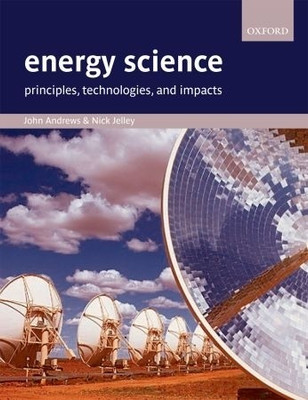Energy Science: Principles, technologies, and impacts(English, Paperback, Nick Jelley, John Andrew)
Quick Overview
Product Price Comparison
Energy Science: Principles, Technologies, and Impacts integrates the science behind the key energy sources that are at our disposal today with the socioeconomic issues which surround their use to give a balanced, objective overview of the range of energy sources available to us today. Covering both traditional and renewable energy sources, the book encourages the reader to evaluate different energy sources on the basis of sound quantitative understanding. It also explores the fundamentals of energy generation, storage and transmission, to build a complete picture of energy supply, from wind turbine, nuclear reactor, or hydroelectric dam, to our homes. Different energy sources have different social and economic impacts; the book uses examples and case studies throughout to help the reader critically assess the information to hand and reach a well-rounded, informed view of the relative merits and drawbacks of the energy sources available. Problems with current and future energy use and supply extend globally; Energy Science: Principles, Technologies, and Impacts introduces the potential solutions that science can offer, within a framework that encourages the critical assessment of the pros and cons of each. Key Features The first undergraduate text to fully integrate the physical basis of energy sources with socioeconomic considerations, to give a well-balanced, objective overview of the field Case studies and examples are used throughout, to help students see the relevance of concepts being introduced in real, applied contexts, so increasing the motivation to learn Mathematical content is fully explained, and more detailed material set apart from the main text, offering flexibility of use for students with varying levels of interest in the quantitative aspects of the subject Extensive end of chapter questions encourage students to engage more fully with the concepts presented, both to check understanding and to develop critical thinking skills The Online Resource Centre features resources for both lecturers and students, enhancing still further the value of the text as a teaching and learning tool About the Author John Andrew former Head of Chemistry and Head of Sixth Form, Hall Cross Comprehensive School, Doncaster (retired) Nick Jelley Professor at the University of Oxford and Fellow of Lincoln College Table of Contents 1: Introduction 2: Thermal energy 3: Essential fluid mechanics for energy conversion 4: Hydropower, tidal power, and wave power 5: Wind power 6: Solar energy 7: Biomass 8: Energy from fission 9: Energy from fusion 10: Generation and transmission of electricity, energy storage, and fuel cells 11: Energy and society


